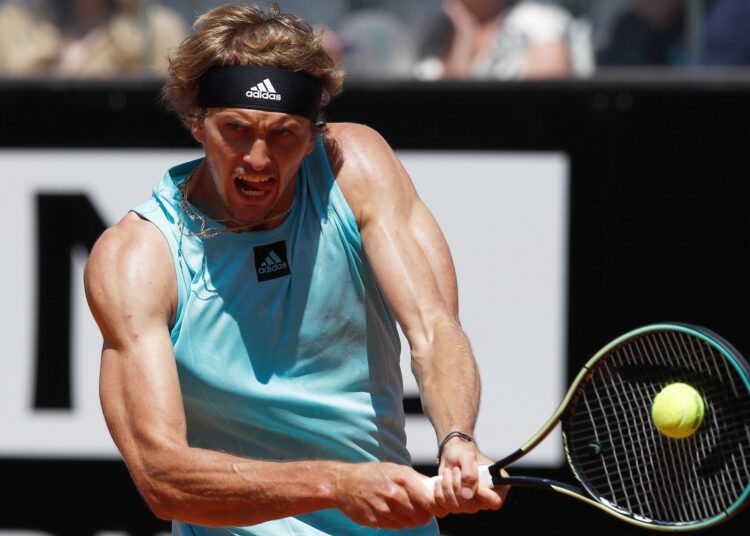MUNICH — Alexander Zverev will not feature for Germany in Davis Cup group stage in Hamburg after experiencing “extreme pain” and is unlikely to play again this year, he said.
Germany begins their Group B campaign against France on Wednesday. They face Belgium on Friday and play Australia on Sunday. The top two nations will advance to November’s knockout phase.
Zverev has been sidelined since tearing ankle ligaments during his semi-final against Rafael Nadal at the French Open in June.
He left the court at Roland Garros in a wheelchair and subsequently underwent surgery to repair three torn ligaments in his right ankle.
The 25-year-old had been named in Germany’s squad last month after missing Wimbledon but suffered a setback in his recovery.
“I guess I did too much and now I’m in extreme pain,” explained Zverev, who said that even walking was causing him discomfort.
“I need to be sensible; otherwise it could be dangerous for the future,” he added according to AFP.
Zverev dropped from second to fifth in the latest ATP rankings published today after the US Open, which he was also forced to sit out.
He has been diagnosed with a build-up of fluid in his ankle, exposing him to the risk of a fracture.
“We’re talking about weeks, and in all likelihood months” before a return to competition, said a despondent Zverev.
His focus could shift to regaining full fitness for the Australian Open in January.
Meanwhile, newly-crowned champions Carlos Alcaraz and Iga Swiatek led a changing of the guard at the US Open as the transition from the “Big Three” era and Serena Williams gathered pace.
The exiled Novak Djokovic, prevented from competing in New York due to US government vaccination mandates for visitors from overseas, may yet return to add to his collection of 21 Grand Slam titles next year.
But the continued absence from men’s tennis of the 41-year-old Roger Federer and the fourth round exit of 22-time Grand Slam champion Rafael Nadal provide further proof that the trio’s era of domination is drawing to a close.
The women’s game is already confronting the departure of an icon, with the 40-year-old Serena Williams heading into retirement following an emotional farewell in New York.
Williams’ exit in the third round, and Nadal’s last-16 defeat, meant that for the first time since 2003 at a Grand Slam event, the quarter-finals of the women’s and men’s draws did not feature at least one of Williams, Nadal, Djokovic or Federer.
“It definitely shows that there’s a changing of the guard going on, and obviously some of it has to do with age — for Roger Federer,” Swedish great Mats Wilander told the Eurosport television network.
“Some of it has to do with Rafa not playing enough matches to be ready, and of course, a lot of it has to do with the fact Novak Djokovic wasn’t allowed to come because he’s not vaccinated.
“But at the same time, the depth in the men’s game is unbelievable.” Adding weight to that view is the fact that the men’s draw saw four new faces in the semi-finals, with debutants Frances Tiafoe and Karen Khachanov joining eventual finalists Alcaraz and Casper Ruud.
The 19-year-old Alcaraz is not quite ready to call time on Nadal, Djokovic and Federer just yet, but acknowledges that a generational shift is well and truly under way.
“As long as Rafa, Djokovic, Federer are there, they will be the best and the rivalry they have between them will always come first,” said the Spaniard after his five-hour 15-minute quarter-final epic with Jannik Sinner.
“But Jannik and I have shown that we are the present and we also have long careers ahead of us,” added Alcaraz, whose title made him the youngest world number one in history.
Alcaraz’s coach Juan Carlos Ferrero cautioned against expecting Alcaraz to emulate the Grand Slam achievements of the Big Three.
“I think it’s going to be very, very difficult to achieve what they have done in tennis,” Ferrero said. “We’re talking about 22 Grand Slams. He has only one.
“But who knows? I think he has all the tennis and potential to be one of the best.” Rising American star Tiafoe believes the depth in the men’s game would prevent one or two players from dominating the post Big-Three landscape.






Discussion about this post